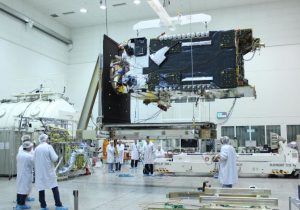
Israeli satellite communications company Spacecom has formally backed away from buyout talks with China’s Beijing Xinwei Technology Group, according to Space News.
“At the moment there are no talks with Xinwei,” said Spacecom’s Senior Vice-President for Sales and Marketing, Jacob Keret, to Space News.
Spacecom and Beijing Xinwei Technology Group had been in talks for the Chinese company to buy out Spacecom for several hundred million dollars. The sale of Spacecom to Beijing Xinwei Technology Group depended upon the successful launch of Spacecom’s AMOS-6 communications satellite aboard a Space-X Falcon 9 space launch vehicle in September 2016. AMOS-6 was to be the fourth Spacecom satellite and was intended to be part of a lucrative Facebook initiative to provide broadband Internet access to the African continent. On September 1, 2016, however, the AMOS-6 satellite was destroyed when the Space-X Falcon 9 SLV it was fitted upon exploded during a prelaunch test at Cape Canaveral, Florida. With that accident, Beijing Xinwei Technology Group expressed less keen to buy Spacecom despite efforts by the Spacecom board to keep the Chinese company engaged.
With the formal withdrawal of Spacecom’s owners from talks with Beijing Xinwei Technology Group, the Israeli company is back on the market.
“The shareholders are still looking for a buyer. This has been done for the last three years. It doesn’t affect us on a daily basis as a company. We get used to this uncertainty,” Keret told Space News.
Certainly, Spacecom has made every effort to reassure customers and the market that it is determined to carry on and grow its business, despite the AMOS-6 accident and the withdrawal of Beijing Xinwei Technology Group as a possible buyer. In December 2016, Spacecom leased AsiaSat-8 – since rebranded as AMOS-7 – to provide coverage that would have been furnished by AMOS-6. Spacecom has leased the satellite from AsiaSat for four years, with the option of another year’s extension, but Keret revealed to Space News that Spacecom is determined to get back on its own feet well before that lease expires.
“We are aiming to give back the Amos-7 satellite to AsiaSat at the end of 2020. This leaves us from today, three and a half years, which is enough time to choose almost any manufacturer. The price of the platform will be a major part of that. Each year that we are leasing the satellite for AsiaSat we have to pay $22 million, and our intention is not to use the fifth year … if one manufacturer will take 36 or 40 months, this has to be taken into consideration,” said Keret.
As well as a replacement for the lost AMOS-6, Spacecom is looking to order a replacement for AMOS-5, to be called AMOS-17. The replacement for AMOS-6 will be called AMOS-8, and Israeli Aerospace Industries (IAI) and Boeing – currently building AMOS-17 – are believed to be the front-runners to build the replacement satellite.
According to Space News, AMOS-8 is likely to be smaller than AMOS-6, and will focus on the European and Middle Eastern markets. AMOS-17, meanwhile, will provide high-throughput capacity for the African, European, and Middle Eastern markets once it is launched in 2019.
With the loss of AMOS-6, Spacecom has been unable to participate in Facebook’s African connectivity programme, and United Arab Emirates’ satellite communications company Yahsat signed up with the social media company to provide coverage that would have been given by AMOS-6.
“With Amos-17, this might be some opportunity for us and for [Facebook], but it’s yet to come. That’s in two years, and many things can change in two years, but yes absolutely we are still talking with them and they are talking with us. There are no hard feelings,” Keret told Space News.
Original published at: https://spacewatch.global/2017/04/israels-spacecom-hangs-tough-signals-end-xinwei-attempted-buyout/
 SpaceWatch.Global An independent perspective on space
SpaceWatch.Global An independent perspective on space

